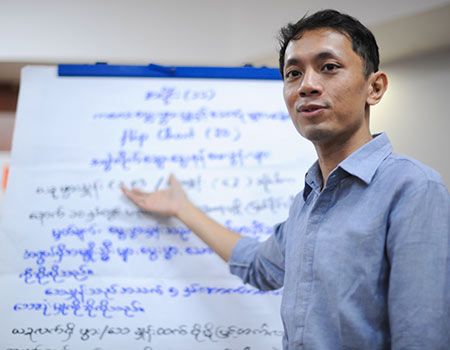The civil society organisations (CSOs) are a diverse group of local organisations that represent community-based organisations (CBOS) and local not-for-profit organisations (NGOs). Their proposed activities will benefit a significant number of stakeholders including women and youth groups, ethnic groups, religious and inter-faith groups, and local and regional authorities in urban and rural areas. They will implement their activities around the country covering all states and regions. It is estimated that they will reach approximately 52,735 beneficiaries through their planned activities.
The process started In November 2014 when UNFPA issued a Call for Proposals (CFP) to support capacity building of local organisations on the use of census data and information. On 27 November 2014, UNFPA conducted an information session on how to submit a proposal, attended by 26 representatives from local CSOs. To further enhance CFP outreach activities, UNFPA asked a number of civil society networks, including Local Resource Centre (LRC), Myanmar Information Management Unit (MIMU), Women Organizations Network (WON), Gender Equality Network (GEN), Karen Women Network, and interfaith organisations to assist with the distribution of the CFP to local community based and civil society organisations.
UNFPA met with a number of INGOs including ActionAid, Pact, ACTED, and the International Rescue Committee (IRC) to discuss how INGOs could support this initiative. In addition, UNFPA met with a number of NGOs, network chairs and INGOs to answer any questions and provide additional information about the CFP. During these discussions, organisations confirmed that they had received the CFP from different networks and shared it with their local partners.

The content of the training was built around a census toolkit which UNFPA and the Department of Population are distributing across the country for organisations to use in their communities to facilitate discussions about the importance of the census results. The toolkit includes 7 key census publications and a DVD resource which explain in detail how the census information was collected and processed, and what information will be available in the main results. The toolkits will enable organisations to build capacity and understanding in using census data results on the ground.
Sagawa has already conducted two training of trainers. The first four day training took place between the 18th to 21stFebruary in Yangon with twenty five participants from CSOs, including Bamars, Shans and Mons from Charity Oriented Myanmar in Yangon, Chins from Community Association for Rural Development in Chin Hills, Kadu Youth Development Association, Farmer Field School from Indaw area in Northern Sagaing Region, Pa-O National Organisation from Shan State in the East, and Tavaoyan and Women Union and Dawei Youth Forum from Taninthayi Region in the South. The second TOT training took place from 23rd to 26th February. A further two TOT trainings will take place between 4thMarch to 7th March and 9th March to 12th March. In total over 100 representatives from civil society and locally based organisations will attend the TOT training.


